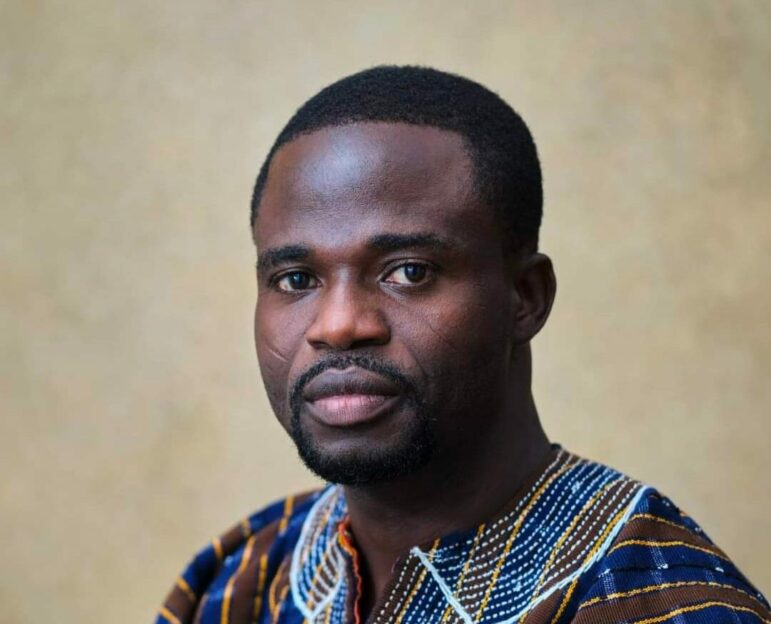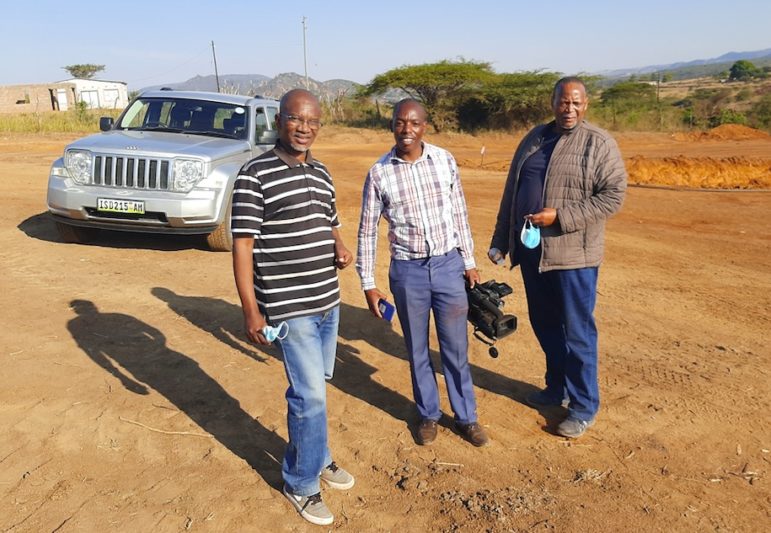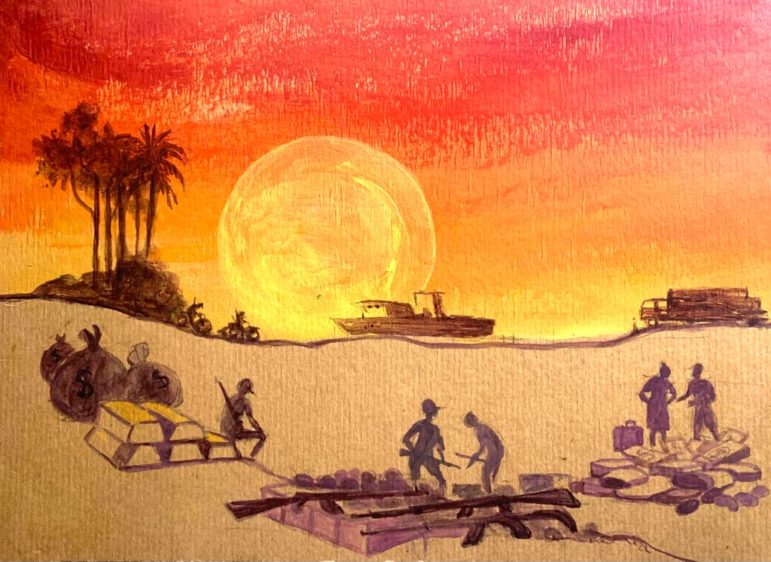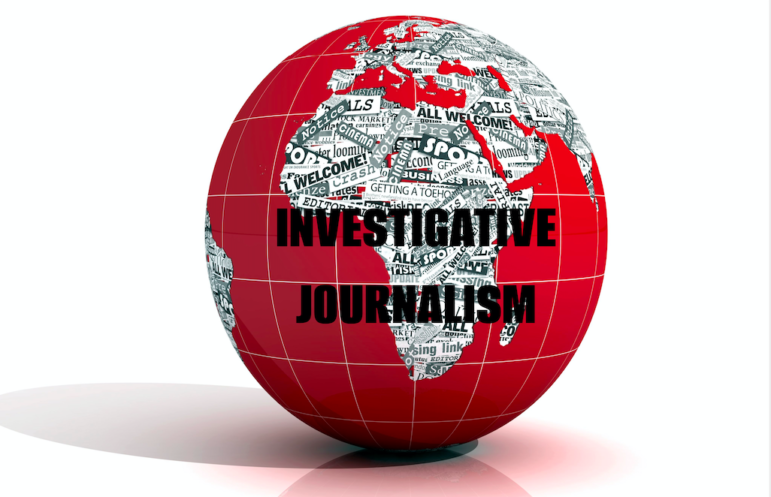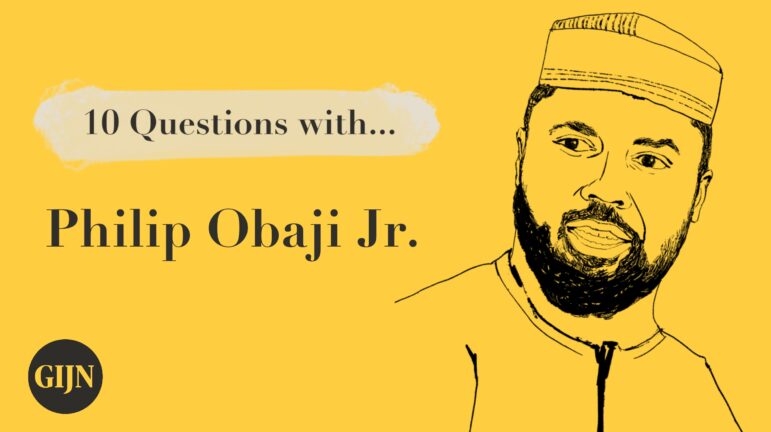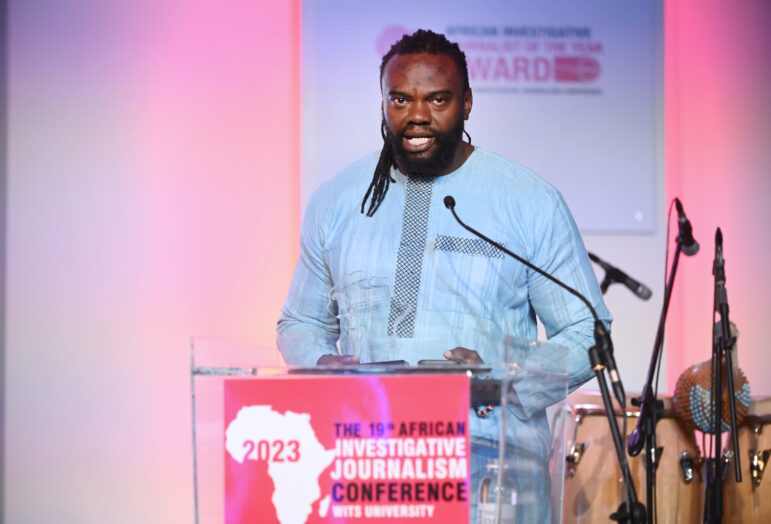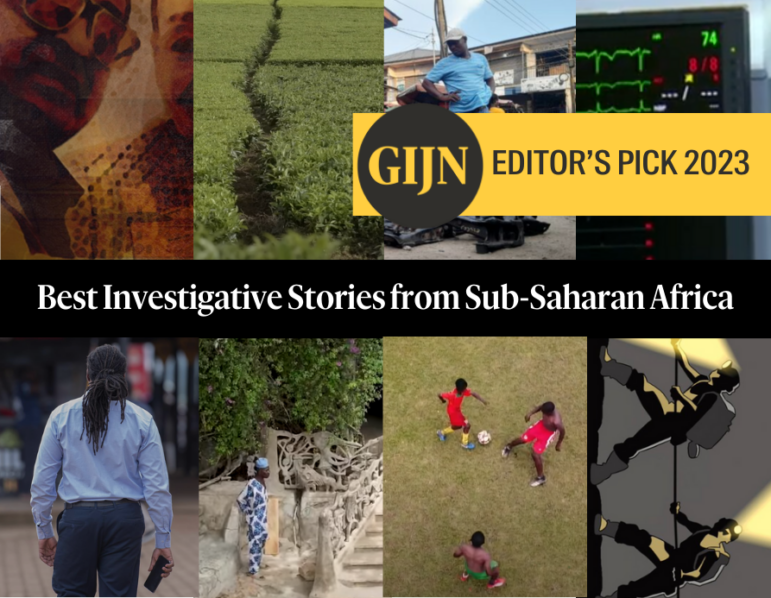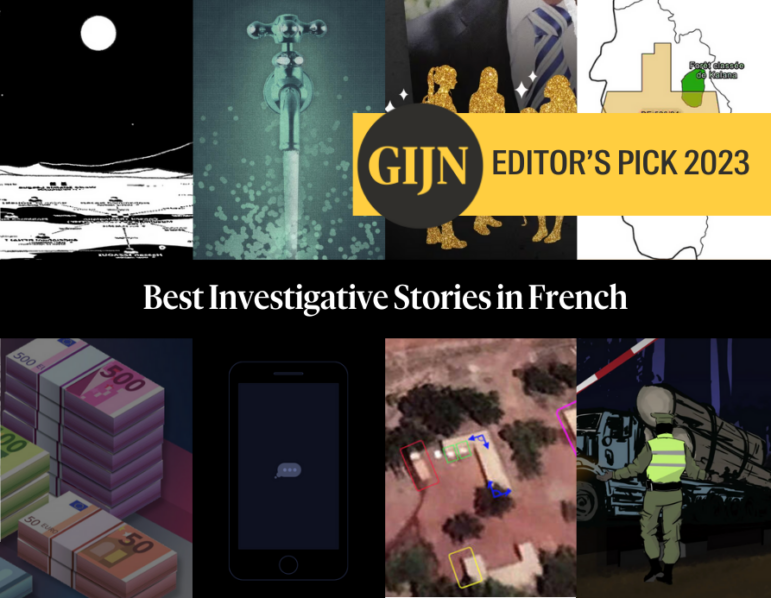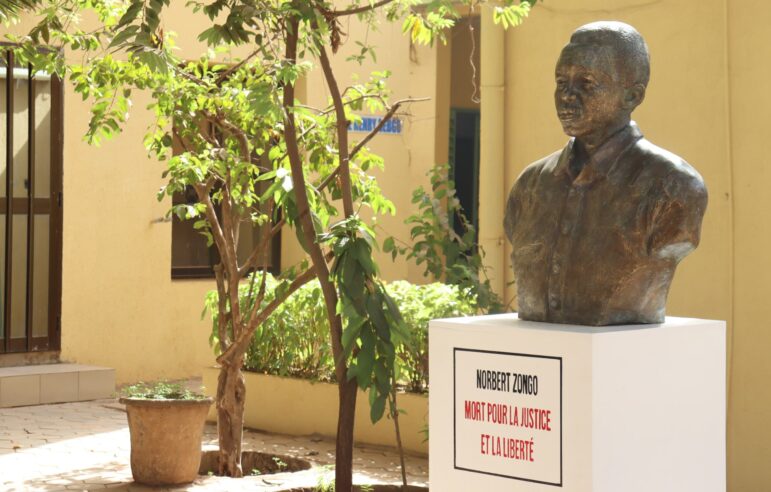

A statue of Norbert Zongo, who died "for justice and freedom." Image: Courtesy of CENOZO
CENOZO, the Organization Shoring Up Watchdog Reporting in West Africa
In Burkina Faso, it is impossible to talk about investigative journalism without mentioning Norbert Zongo, an iconic figure who was assassinated on December 13, 1998.
Zongo was the founder and director of the weekly L’Indépendant newspaper — an outlet that lived up to its name with a reputation for in-depth investigations and for prioritizing free speech. As a journalist, Zongo was known for his refusal to accept bribes and risked his life to investigate the suspicious death of a chauffeur who worked for the brother of the president.
The death of this renowned journalist — whose body was found in a burnt-out car on the roadside, alongside those of two colleagues and his brother — played a significant role in transforming the media landscape in Burkina Faso, a landlocked West African nation between Mali and Ghana.
The fight for justice and the demand for accountability following Zongo’s assassination gradually led to an improvement in the country’s ranking in the annual World Press Freedom Index published by Reporters Without Borders. Two decades after Zongo’s death, Burkina Faso ranked 41st in the world — its best position to date. (A very recent deterioration in press freedom, and a military coup, saw it drop to 58th place in 2023).
But back in 2015, when 18 journalists from West and Central Africa gathered in the Burkinabe capital, Ouagadougou, to honor Zongo’s struggle and work, it was only natural that the initiative they would decide on would be named after him, and reflect his dedication to reveal the truth, and to fight for justice and accountability. The journalists, with the support of the United Nations Office on Drugs and Crime (UNODC) and the embassy of Denmark, established the Norbert Zongo Cell for Investigative Journalism in West Africa (CENOZO). Two years after its founding, CENOZO was accepted as a member of the Global Investigative Journalism Network.
After nine years of operation, CENOZO has gained an international reputation for its flagship activities, which include training in the practice of investigative journalism, and financial and technical support for investigations. The cell’s main objective is to improve the investigative capacity of reporters in the fields of corruption, organized crime, governance, human rights violations, and the environment.
“Since CENOZO became operational, some 600 journalists have been trained throughout the sub-region,” explains Arnaud Ouédraogo, the coordinator of CENOZO, adding that now that the organization has scaled up, an average of 100 journalists receive training each year.
“This achievement holds great significance for CENOZO as it contributes to the elevation of journalism standards in West Africa,” Ouédraogo explains. “Given the challenging environment for journalists, marked by limited media resources and inadequate journalism training programs, it is essential for organizations like ours to establish ongoing training initiatives.”
Collaborations Inside — and Outside — Africa
The organization launched at a time when collaborative and in-depth cross-border investigations were becoming mainstream. One of CENOZO’s first big projects was the West Africa Leaks investigation, published in 2018.
“It was the first time that investigative journalists from all over West Africa collaborated to produce a series of investigations on capital flight, money laundering, and tax evasion across the entire continent,” explains Ouédraogo. All told, more than a dozen journalists from 11 West African countries worked together with the International Consortium of Investigative Journalists (ICIJ).
Next came the Pandora Papers, another ICIJ-facilitated investigation that dug into a shadow financial system that benefits the world’s rich and powerful.
Reporters working with CENOZO have also been involved in the FinCEN Files: where journalist Moussa Aksa published an investigation into a military procurement scandal in Niger, which one activist called “the scandal of the century.”
Fergus Shiel, the managing editor of the ICIJ, said the CENOZO team had been “wonderful collaborators” on a number of large-scale projects. He lauded both the group’s president, David Dembele, and general secretary, Sandrine Sawadogo, as “experts in uncovering illicit financial flows and corporate fraud and lodestars for investigative reporters across West Africa.”
They had, Shiel added, provided “repeated assistance in investigating injustices in Africa in the face of perennial hurdles.”
If you look at the CENOZO site today, readers can find a wide range of investigative articles addressing current challenges in West African countries. From a story on the failure to restore former mining sites in Burkina Faso, to cigarette trafficking across the Sahel, to an investigation into the Niger River, which reporters warn is “in jeopardy.”
Financial and Security Support in Uncertain Times
CENOZO supports journalists’ investigative work by providing financial resources alongside training — grants vary from €500 – 3,000 (US$540 – $3,250) depending on the nature of the story, and whether it is local or cross-border. CENOZO says upwards of 300 investigations have been published as a result of these grants.
Ouédraogo says financial support for investigative reporting is vital in a region where media outlets rely heavily on advertising, and generally struggle to finance the production of in-depth articles. This precarious funding situation has worsened recently due to the economic impact of political crises in the area.
From a security perspective, the unit supports journalists by training them on digital and data security, reporting best-practices, and the best ways to communicate safely with sources. In some particularly sensitive cases, editors, and even lawyers, can help prepare a story for publication.
The team can also step in to provide support when CENOZO members come under attack. In the case of the reporter from Niger, Moussa Aksa, CENOZO provided legal support and helped to keep him safe.
“When the journalist published this investigation, he faced intimidation, threats, and lawsuits,” explains Ouédraogo. “The case is still ongoing in court, and although he has never been convicted, he is unable to continue working. We supported him, provided legal assistance, and eventually had to relocate him from Niamey for his safety.”
Leveraging Accountability Journalism for Greater Impact
Lastly, CENOZO organizes public debates on governance issues. These multi-stakeholder roundtables bring journalists, civil society representatives, and public officials together to discuss issues like corruption, climate change, and human rights.
Ouédraogo believes that these different areas of intervention have helped to revolutionize media production in the West African region, and outsiders also see the value of their work.
“CENOZO plays a crucial role, providing a platform that helps journalists stay informed and adapt to any situation,” explains Dr. Sita Traoré Diallo, from ISTIC, Burkina Faso’s practical journalism training school, who has herself benefited from CENOZO training courses during her career.
She points to the challenging context of journalism in West Africa, especially in the Sahel region where security and political crises have escalated, to explain the scale of the challenge. Armed terrorist groups are prevalent in a number of countries, targeting state institutions, civilians who resist their ideology, and the press. The prevailing climate of insecurity has led to military takeovers which have further restricted freedom of opinion and expression.
In Burkina Faso itself, “growing violence and political instability have had a very negative impact on journalists’ security and access to information,” RSF warned this past year. While the culture of investigative journalism in the country is strong, the press freedom group says “the deterioration of the security and political environment has brought an increase in outside pressure and self-censorship.”
Investigative reporting in these conditions requires significant investment, sacrifice, and dedication, Traoré Diallo says. “While investigative journalism is becoming increasingly difficult, it is not impossible,” she says. “Investigative journalism makes public decision-makers cautious because they know they can be held accountable.”
Sandrine Sawadogo, the general secretary of CENOZO, also sees opportunity despite the challenges. “For us, the current security situation is an opportunity to redevelop investigative journalism, to get closer to the population and reduce mistrust. Investigative journalism faces challenges, but we remain optimistic,” she told GIJN.
Keeping the Flame of Investigative Journalism Alive
CENOZO has a seven-member board of directors, drawn from Senegal, Mali, Togo, Nigeria, Ghana, and Burkina Faso, and a four-person technical secretariat, which oversees its management. The team also works with a network of freelance editors.

CENOZO, headquartered in Burkina Faso, sits in the heart of West Africa and the continent’s Sahel region. Image: Datawrapper
Reporters of all backgrounds can receive CENOZO training, and apply for the grants. Some of the most well-known names in investigative reporting in the region are also members. Membership applications are considered by the board, and there are currently over 40 reporters on the list.
Before CENOZO commissions an individual story, the proposal undergoes an examination process that sees an editorial team evaluate its relevance, feasibility, associated risks, and the journalist’s background to assess their ability to work on the subject. Once a project is chosen as suitable for backing, CENOZO contacts possible donors to help finance the investigation.
In particular, CENOZO values gender equality, and 40% of the grants provided by the organization are specifically tailored for women to try and encourage more women to work on investigative subjects.
But CENOZO is also trying to ensure its future, and recognizes the need to position journalism as a guardian of the public interest. This is even more important in the Sahel context, where governments have tried to win points by criticizing the press for focusing only on problems.
One way of challenging that, says Ouédraogo, is to include some form of “solutions journalism” in its training approach in future.
“Solution journalism is still investigative, but it focuses on potential solutions instead of problems,” he explains. “Journalists were criticized for never proposing solutions. Today, a new genre of journalism is emerging, and we’re trying to promote it,” he says.
 Oumar Zombre has worked as a journalist in Burkina Faso for 12 years, including several at the national broadcaster. He also works as a freelance reporter. Zombre has been embedded during anti-terrorism operations in Burkina Faso, Mali and Niger, and has won national and international awards, including the PaxSahel Award for Peace Journalism and an African Investigative Journalism Award.
Oumar Zombre has worked as a journalist in Burkina Faso for 12 years, including several at the national broadcaster. He also works as a freelance reporter. Zombre has been embedded during anti-terrorism operations in Burkina Faso, Mali and Niger, and has won national and international awards, including the PaxSahel Award for Peace Journalism and an African Investigative Journalism Award.

